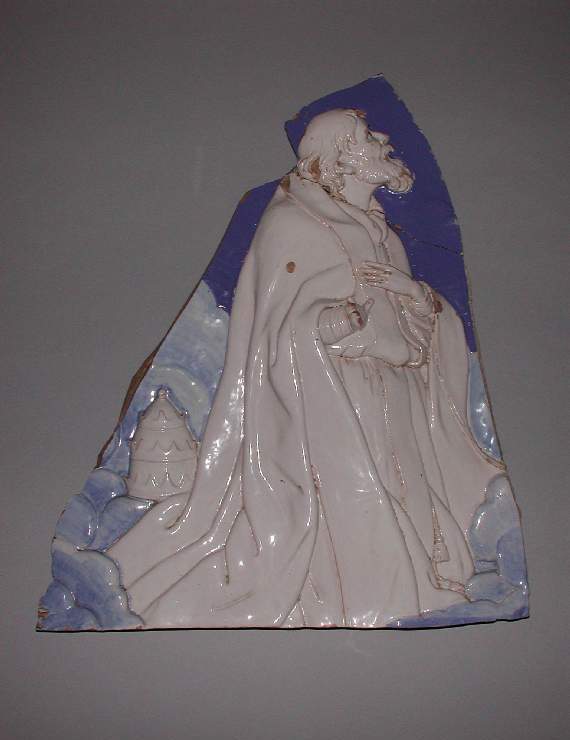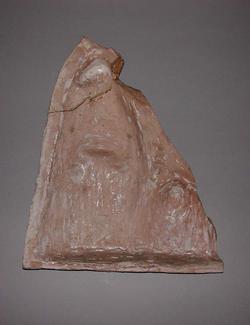Current Location: In storage
Titles
Kneeling Pope
Maker(s)
Workshop:
Della Robbia, Giovanni
(Style of)
Factory:
Ginori family
(Probably)
Entities
Categories
Description
Buff, slightly pinkish moulded terracotta, tin-glazed white on the front; dribbles of glaze on the back. Triangular framgent with flat lower edge. The back is hollowed out where it projects at the front. The right edge is smooth and has some cement attached to the middle; the left side has been broken irregularly. Glaze colours: opaque lavender-blue lighter translucent blue, and manganese-purple.
A pope, Sixtus II (St), kneels in profile to right. His head is raised and his left hand rests on his chest; his right hand is held just above waist level and originally had the fingers extended. He is bearded and bareheaded; his tiara rests on a bank of clouds behind him and there is another bank of clouds in front of him.
Notes
History note: Formerly Arcangelo Marcioni or Ferdinando Lucatelli of Orvieto; sold Sotheby's, 17th February, 1914, Catalogue of the collections of early Italian pottery formed by Signor Avvocato Marcioni and Cavaliere Capitano Lucatelli of Orvieto, p. 32, lot 317; Sotheby's, 18 June 1928, Continental and English Pottery, lot 29; Alfred Spero, from whom purchased.
Legal notes
Given by the Friends of the Fitzwilliam Museum
Measurements and weight
Depth: 8.1 cm
Height: 55.3 cm
Width: 47.5 cm
Acquisition and important dates
Method of acquisition: Given
(1928-07-05)
by
The Friends of the Fitzwilliam Museum
Dating
19th Century, Mid
Production date:
in or after
AD 1853
: Accessioned as sixteenth century, but mid nineteenth century.
Note
This fragment of a larger lunette-shaped relief shows a kneeling Pope, his status indicated by the papal tiara resting on the clouds behind him. When sold in Sotheby’s sale of the Marcioni and Lucatelli collections of Italian maiolica on 17 February 1914, it was described as ‘a very fine piece of Della Robbia ware’. And when presented to the Museum by the Friends of the Fitzwilliam in 1928, it was still attributed to the Della Robbia workshop. The Pope bears a resemblance to kneeling figures by Andrea Della Robbia, such as the Apostles in his Pentecost of c. 1500-05 in San Matteao, Memmenano, but the modelling is much shallower. It is now known to have been produced in 1853 or shortly after by the Ginori factory at Doccia in Tuscany.
The figure formed part of the left side of a lunette with reliefs of a standing Madonna and Child with Saint Sixtus (Pope Sixtus II, d. 258 CE) kneeling in adoration on the left, and St Barbara standing on the right, closely based on the painting known as the 'Sistine Madonna' by Raphael (1483-1520) which had been commissioned in 1512 for the church of San Sisto (Sixtus) in Piacenza, and now in the Gemäldegalerie Alte Meister in Dresden.
Six of these Della Robbia style lunettes were commissioned by a wealthy art collector and benefactor, Francis Joseph Sloane (1794-1871), who installed one of them in the Villa Medici at Careggi which he had acquired in 1848. Sloane’s great wealth was partly derived from his co-proprietorship of a copper mine at Corporciano, near Montecatini Val di Cecina in Tuscany, and two of the lunettes were installed there: one the façade of an oratory dedicated to the Madonna and St Barbara, the patron Saint of miners, and the other in a subterranean chapel in the mine. Two more reliefs were placed in churches in the via in the via delle Masse, Florence, and at Briglia. These lunettes were a new departure for the Ginori factory which had previously produced tin-glazed terracotta reliefs based on fifteenth-century sculpture by the Della Robbia family. They were clearly identified as modern products by the presence of a shield bearing the Ginori arms and the inscription ‘Manifattura Ginori 1853’ situated behind the kneeling Saint Sixtus.
The history of this fragment is not known before it came to England in 1914, but it seems likely to have been part of the relief whose whereabouts is not known, or of a later example. Its right edge follows the division between the left and central sections of the surviving lunettes, but the left side is unevenly broken, and the shield of arms is missing. This may have resulted from accidental damage, but seems more likely to have been the result of deliberate intervention to remove evidence of the relief’s true date. The fragment demonstrates how the high quality of Della Robbia-style reliefs legitimately made by the Ginori factory permitted them to be passed off as Renaissance works on the art market within a fairly short time of their manufacture. Another example of this, by an unidentified maker, is the Madonna and Child, M.2 & A-1935.
School or Style
Renaissance
People, subjects and objects depicted
Project
Components of the work
Decoration
composed of
metallic oxides
( cobalt producing opaque lavender-blue lighter translucent blue, and manganese-purple)
tin-glaze
Figures
Materials used in production
Earthenware
Inscription or legends present
Inscription present: rectangular with serrated edge on left and a red line printed down that side
- Text: 6939
- Method of creation: Inscribed in pencil
- Type: Label
Inscription present: half an octagonal label with fancy blue printed border
- Text: ...09
- Method of creation: Inscribed in black ink
- Type: Label
Inscription present: lot number in Marcioni-Lucatelli sale in 1914
- Text: 317
- Location: On back
- Method of creation: Hand-written in pencil
- Type: Inscription
References and bibliographic entries
Identification numbers
Accession number: M.2-1928
Primary reference Number: 48237
External ID: CAM_CCF_M_2_1928
Stable URI
Audit data
Created: Saturday 6 August 2011
Updated: Tuesday 31 December 2024
Last processed: Wednesday 14 May 2025
Associated departments & institutions
Owner or interested party:
The Fitzwilliam Museum
Associated department:
Applied Arts





